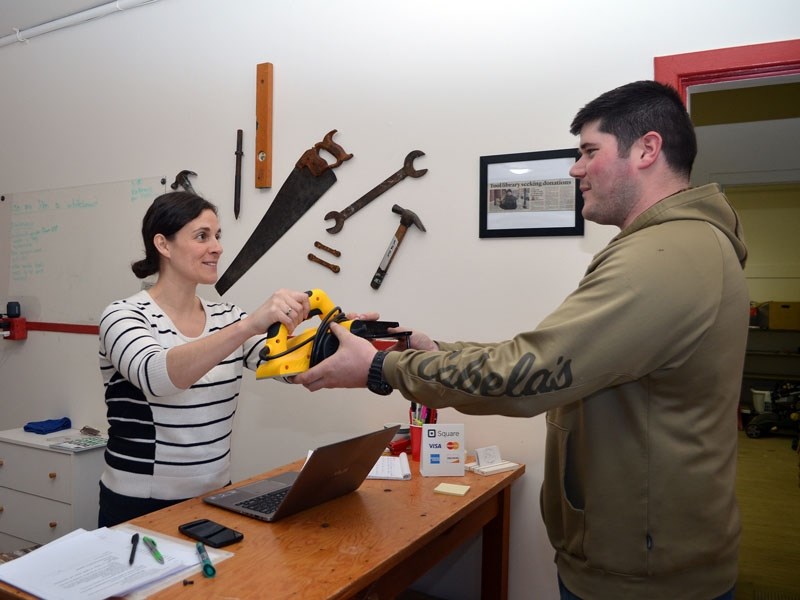Though renovating their downtown condo was a rewarding experience, Leslie Bush and Shannon Leblanc ended up spending thousands of dollars renting equipment and buying specialty tools they only used once.
It was this stockpile of barely-used tools – like the diamond tipped hole saw used to install a single showerhead – and nowhere to store them, that inspired the couple to start Edmonton’s first tool library.
“It was just going to sit there, so we looked at each other and wondered ‘What do you do with old tools?’ How do you let people know about resources out there to borrow from other people?” says Bush.
The Edmonton Tool Library opened its doors in January, after a successful crowd-funding campaign helped raise the capital necessary to lease space, purchase tool lending software and acquire board and liability insurance. Now, for a $50 annual membership fee, anyone in the capital region can borrow just about every home renovation tool needed from its library of more than 500 tools.
Like many aspects of the social economy, tool libraries are not a new concept. The first wave occurred in the U.S. in the late ’70s, with the opening of a tool library in Berkley, California in 1979.
The new millennium brought with it a renewed interest in collaborative economy and a resurgence of these establishments across North America. Currently, there are over 100 tool libraries operating in Canada and the U.S.
Nearly every major Canadian urban centre has a tool library, and the one in Toronto has given way to Canada’s first library of things. The Sharing Depot gives access to everything from camping gear, to tennis racquets to board games — things that people use only a few times a year, so might not want to invest in.
While modern tool libraries have been associated with sharing economy, they have more in common with social enterprise, such as credit unions and bicycle co-ops.
“It seems like a lot of people associate (the sharing economy) with Airbnb and Uber,” says Bush. “Those aren’t really sharing; those are capitalist economic activities that are crowd-sourcing the resources.”
Many critics say that the sharing economy is a misnomer. The multi-billion dollar movement may have started as a way to share goods and services, such as a spare bedroom or handyman skills, but these peer-to-peer rental services are largely driven by profits.
A Statistics Canada survey asking Canadians about their use of services like Uber and Airbnb, found that 2.7 million Canadians spent $1.31 billion on peer-to-peer ride and accommodation services between November 2015 and October 2016.
Social enterprises, on the other hand, are more interested in community benefit. These citizen-led efforts focus on a people-centred economy, also called social economy, which places people and planet before profit.
The concept of tool libraries, or Toronto’s library of things, goes beyond simply pooling resources to help eliminate waste or maximize use. It reduces financial barriers.
The library’s most popular tool is their compound mitre saw. Used for everything from cutting deck boards to installing trim, mitre saws are versatile — but also costly.
Quality mitre saws begin selling for around $700 and while many power tools are available for rent at local hardware or equipment rental stores, as Bush learned renting equipment over the course of a renovation project could become costly.
By implementing a yearly membership fee rather than rental fees, the Edmonton Tool Library and Toronto’s Sharing Depot make accessing tools and other items more affordable, which in turn empowers individuals to take on projects or activities they may not otherwise have been able to.
“Not everyone is going to access the tool library but having it there, makes us stronger and more resilient as a community,” says Bush. “It means people can do a little bit more with a little bit less.”
With increasing rates of unemployment, an ever-widening wage gap and looming food and environmental crises, social entrepreneurs, charitable organizations and other non-profits have been stepping up more than ever to fill gaps in service provisions and to affect social change, says Dr. Mike Gismondi, a professor of sociology and global studies at the University of Athabasca.
While it may be hard to see how a tool library can affect such change, Gismondi says smaller projects of this sort are an important part of the overall social economy.
“These small projects are stepping stones to much larger steps we all have to take to re-control the places that we live,” he says.
Bike co-ops for example are about much more than providing access to used parts or tools. They’re about reciprocity, mutual aid and inclusion. They empower individuals to become increasingly resourceful, resilient and civically minded.
“It starts with you maybe needing a bike, but you learn about gender issues and equality, about poverty and wealth. Then you also start to learn how to change municipal policy, lobby government and make actual change in the physical infrastructure of where you live,” says Gismondi.
The Edmonton Tool Library is currently exploring partnerships with different organizations, such as the Dying Light Collective, a skills acquisition group that wishes to run DIY workshops at the library. Bush says he would also like to partner with maker spaces and community garden projects.
“We’re trying to build this idea of social economy, where people contribute to their economy in ways that aren’t just labour or material or capital,” says Bush. “Giving people the space and ability to take on projects or even just to meet other people, that’s how you build the overall community of a city.”
The Edmonton Tool Library is open every Saturday from 1 to 5 p.m. at the Bellevue Community League. The library has over 500 hand and power tools available to borrow.




